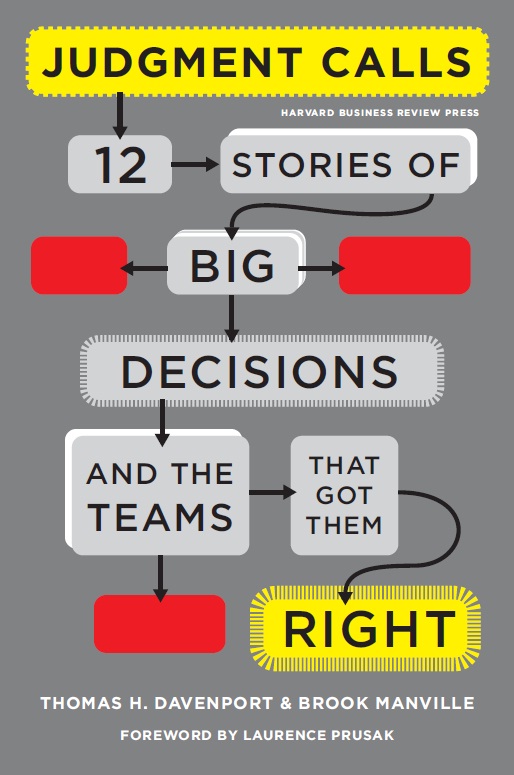Recommended Resource – Judgment Calls
Judgment Calls: Twelve Stories of Big Decisions and the Teams That Got Them Right
by Thomas H. Davenport and Brook Manville
About the Reference
Judgment Calls by Thomas H. Davenport and Brook Manville examines twelve mission critical decisions made by public and private organizations for the key aspects of the decision process employed and analytical approaches used. Through this exploration, Thomas and Brook discuss organizational factors influencing successful decision-making including:
- Participative Problem-Solving Processes
- Technology and Analytics
- Power and Culture
- Leaders Setting the Right Context
They assert that effective employment of these factors enhances organizational judgment and therefore its decision-making capability. The twelve detailed examples within their book serve as a roadmap for those seeking to further develop their organization’s decision-making ability.
Benefits of Using this Reference
StrategyDriven Contributors believe in the inherent value of reading books, such as Judgment Calls, that provide deep insights to the decision-making processes of respected organizations during critical situations. Thomas and Brook obviously had access to the senior leaders at each organization profiled; enabling them to garner the though processes and reasoning behind the decisions being made.
Valuable as it may be, we believe there are flaws in Thomas and Brook’s approach to ascertaining the key factors behind successful decisions. Most prevalent among these flaws is an apparent assumption that successful outcomes were the result of a sound decision-making approach and the correction of the organization’s past decision-making shortfalls; not the result, in part or whole, of good fortune or luck. (Note that Thomas and Brook did examine some failed decisions of examined organizations, however, we found those reviews to be incomplete when compared with StrategyDriven‘s analysis.) We would have liked to have seen additional testing whereby the processes leading to successful decisions were tested against decision-making shortcomings observed in other organizations. In our experience, organizations may experience a series of successful decision outcomes because circumstances that would otherwise challenge their area of vulnerability are not manifest. When such a circumstance does arise, the organization’s decision process fails to recognize or appropriately deal with it leading to an adverse outcome.
StrategyDriven Contributors have studied high-risk decisions – both the successes and the failures – made by organizations such as NASA and nuclear utilities around the world; identifying principles and practices to be embraced and those to be avoided. Indeed, one of our contributors co-authored the standards by which the U.S. nuclear industry processes its high-risk decisions. While we agree with the four organizational factors associated with successful decision-making as outlined in Judgment Calls, we believe there are many others demanding close attention in order to consistently achieve desired outcomes. Our insights to high-risk decision management can be found in StrategyDriven’s Decision-Making topic area.
While we believe the approach taken to draw the conclusions contained within Judgment Calls to be flaw, the book offers otherwise inaccessible insight into the decision-making processes of respected organizations making it a StrategyDriven recommended read.

